DePauw in Ecuador 2009
April 24, 2009
The age-old challenges that first-year students face at the start of their college careers haven’t changed much over the years. The challenges still include saying goodbye to tearful family members, meeting new friends, navigating a new campus and community, and finding a delicate balance between academic and social life.
However, for more than 20 first-year students participating in the DePauw in Ecuador Program this summer, there is one more challenge: doing all of the above in Spanish. For a non-native Spanish speaker, this can be a daunting task.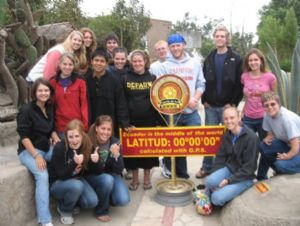 In its third year, the DePauw in Ecuador Program is thriving with a record number of applicants. Created by a major gift from Steven L. Trulaske ’79 and his wife, Michelle, the program combines a three-week on-campus experience and a two-week service trip to Quito, Ecuador. Robert P. Hershberger, associate professor of modern languages (Spanish) and chair of the modern languages department, worked with Trulaske in 2006 to develop the program. Hershberger and Maria V. Luque, associate professor of modern languages (Spanish), were the first team of faculty advisers to oversee the program in 2007.
In its third year, the DePauw in Ecuador Program is thriving with a record number of applicants. Created by a major gift from Steven L. Trulaske ’79 and his wife, Michelle, the program combines a three-week on-campus experience and a two-week service trip to Quito, Ecuador. Robert P. Hershberger, associate professor of modern languages (Spanish) and chair of the modern languages department, worked with Trulaske in 2006 to develop the program. Hershberger and Maria V. Luque, associate professor of modern languages (Spanish), were the first team of faculty advisers to oversee the program in 2007. 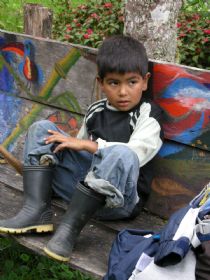
This year, faculty advisers are Sandro Rodrigo Barros, assistant professor of modern languages (Spanish), and Spanish instructor Maria Soledad Forcadell. Advisers in 2008 were Linda L. Elman, associate professor of modern languages (Spanish), and Alejandro Puga, assistant professor of modern languages (Spanish). The 2009 program dates are June 28-Aug. 2.
Upon arrival at campus, the incoming first-year students are asked to sign a pledge to speak Spanish only. Language immersion is an important component of the program. The students are on campus for three weeks and attend a daily Spanish class taught by Paul Johnson ’04, a Ph.D candidate in Spanish literature at the University of California. The students participate in classroom discussions about social activism with Professor Barros to better prepare them for service in Quito.
Students will complete service projects in the Greencastle area, play volleyball, and take day trips to nearby parks and to events in Indianapolis. Once in Quito, they will continue their service work by teaching English and art classes to local children. The DePauw student group will take planned weekend excursions to nearby breathtaking sites including Baños, where students ride bikes down the mountainside along waterfalls: Otavalo, the largest Indigenous market in Ecuador: and Siempre Verde.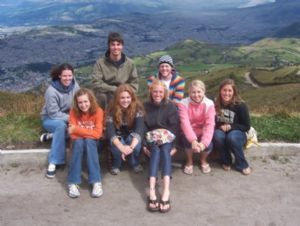
The extraordinary strength of the student leadership is a unique aspect of the program. Each year, several DePauw upperclass students are selected by program faculty advisers to help plan and implement the summer program. The students begin working in earnest on the program in February each year. Their responsibilities include being a part of the program selection committee and meeting regularly with faculty advisers throughout the semester to carefully plan the program.
The students take charge by leading service projects, group bonding activities, and reflection sessions both on campus and in Quito, and act as mentors to the incoming students. The program has flourished during the last three years because of the student leaders’ commitment and dedication to the program’s success and continuation.
The leaders this year are program veterans, Carolyn C. Latta ’12, Emma J. Minx ’11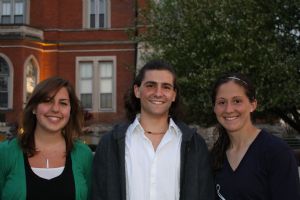 and Zakary D. Phillips ’11 (see photo at right).
and Zakary D. Phillips ’11 (see photo at right).
Latta was a participant in the program last year, and one challenge she didn’t face as a first-year student was an unfamiliar campus. While growing up, she visited Greencastle many times with her mother, Mary (Matson) Latta ’83.
The younger Latta was thrilled to have the opportunity to be a part of the DePauw in Ecuador program. It was a natural fit for her, and it combined her love of volunteerism and travel. It also gave her the chance to put five years of high school Spanish study to use. However, she says, “Meeting new people and speaking in Spanish to each other in whole sentences was in and of itself a challenge.”
She says that being a program participant was an incredible learning experience. “It was a great introduction to college life.” When asked how it felt when she returned to campus in August with the entire class of first-year students, she says, “It felt like coming home.” She is enthusiastic about the program this summer. “I’m really excited to see the program from a different perspective.”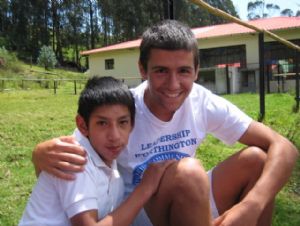 Phillips, a music performance and philosophy double major, was a program participant in 2007 and is returning as a student leader this year. He says, “When I was in Ecuador a year ago, I didn’t want to leave.”
Phillips, a music performance and philosophy double major, was a program participant in 2007 and is returning as a student leader this year. He says, “When I was in Ecuador a year ago, I didn’t want to leave.”
Phillips connected with the Ecuadorian people and hopes that incoming students will take time to get to know them. For example, Phillips says, “When traveling in Ecuador, I would stay on the bus after every one got off just to talk to the driver. It was an opportunity to have a real conversation. We talked a lot about music.” Phillips, a violinist, plans to introduce a music component to the program this summer.
For Minx, the DePauw in Ecuador Program changed the way she looks at service. She was a participant in the program’s inaugural year and is a student leader for a second year.
“I didn’t know why I did service before coming to DePauw. The DePauw in Ecuador Program opened my eyes to the ‘why’ and made me question it.” Minx’s participation as a Bonner Scholar helped jump start her ideas about service – something for which she is grateful.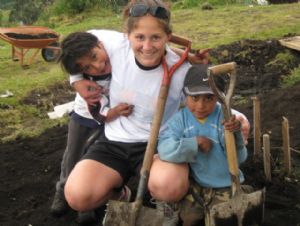 Minx says, “I wanted to get involved in the DePauw in Ecuador program as a leader and give back what the program has given me. It opened my eyes to international service and challenged me to think about its implications.” She says, “The program has helped me to develop my leadership skills. Now I’m involved and not afraid to state my opinion.”
Minx says, “I wanted to get involved in the DePauw in Ecuador program as a leader and give back what the program has given me. It opened my eyes to international service and challenged me to think about its implications.” She says, “The program has helped me to develop my leadership skills. Now I’m involved and not afraid to state my opinion.”
The group has been well received by the Ecuadorans in the past. “The people are so open and willing to accept you,” says Minx. “They enjoy life. They’re not worried about cell phones and iPods. What’s important to them is their family and the people they’re with.”
Hershberger says of the program’s leaders, “We are really enthusiastic about the level of excitement and dedication from past program participants. This energy is key to the success of the program as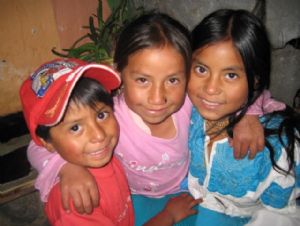 we count on several of these students to help us plan and then lead the upcoming summer program.
we count on several of these students to help us plan and then lead the upcoming summer program.
"As past participants of the program, they understand best how the program should work and what intangibles need to take place to duplicate the transformational experience for the next group. As an example, Rebecca “Becca” G. Maddrell ’11, a former leader of the program, is working with us on the design of our summer 2009 program even though she will not be working as a leader when the students arrive. We are immensely grateful for the contributions and passion of people such as Becca, Zak, Emma and Carolyn.”
